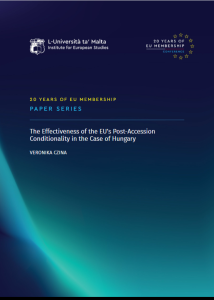The Effectiveness of the EU’s Post-Accession Conditionality
in the Case of Hungary
Veronika Czina
20 Years of EU Membership Paper Series
Institute for European Studies at the University of Malta
The paper series analyses and discusses various elements
of Malta’s 20th anniversary of EU membership.
Abstract
It has been more than a decade since Prime Minister Viktor Orbán acquired power in Hungary with a two-thirds majority in Parliament and set up a government that has been openly contradicting EU rules and legislation in more than one policy areas. The freedom of the press, the independence of the judiciary, academic freedom, the fundamental rights of refugees, minority rights and corruption are among those areas where Hungary was vastly criticized by one or more EU institutions in the past years. The EU has several means to address rogue Member State behavior. Some of them, for example infringement proceedings, are regularly used to monitor Member State compliance, whereas others, such as the Article 7 procedure, have been seldom applied and with no tangible results. In April 2022 the rule of law mechanism has been activated against Hungary and resulted in withdrawing EU funds from Hungary. These – rule of law monitoring – procedures are different in nature and would have different consequences if they were carried out entirely, however, should Hungary comply with them, they could have serious impacts on the domestic policy-making mechanisms of the country. This paper evaluates the EU’s post-accession conditionality mechanisms through the example of Hungary and tries to find out what are the most effective tools of the Union to address rogue Member State behavior.
Keywords: Hungary, EU, post-accession conditionality, rule of law, rule of law
mechanism



